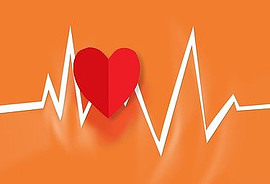What is the average pulse rate

So… what is the average pulse rate exactly? Well, truth be told there isn’t one set number that is the only healthy heart rate or pulse rate.
A healthy (normal) pulse rate (or heart rate) is actually considered to be within a range rather than a specific number. The commonly accepted range is 60 to 100 beats per minute, with a lower number generally suggesting a greater level of fitness and/or health. It is important to note that these numbers are based on the resting heart rate. Obviously during exercise the pulse rate will increase to pump more blood faster, and effectively deliver oxygen to the areas of your body that have increased demand.
Is the resting heart rate static, or dynamic? Dynamic!

While it is important to note that our heart rate can be influenced by many factors, it is also critical to know that a resting heart rate that falls outside of this range isn’t necessarily cause for concern either. Oftentimes athletes, or very fit individuals, will have a resting heart rate below 60 beats per minute. Assuming they have been checked out by a doctor and do not experience symptoms of bradychardia this is merely a sign of a very efficient heart and circulatory system which is actually a positive thing. Individuals with a low resting heart rate that are also experiencing light headedness, dizzyness, lack of energy, weakness or any other signs of illness should always be evaluated by a medical professional. Likewise, if you are not overly active and your resting heart rate falls below 60 beats per minutes that may be perfectly normal for your body, but it is still worth getting checked out to be sure.
On the flip side, a resting heart rate above 100 beats per minute in an adult should always be evaluated by a medical professional as it is more commonly a cause for concern. Babies and young children have a slightly different baseline range than adults do, as is common among most species.
Have a resting heart rate totally within the norm? That’s great! But it still doesn’t mean you should ignore your basic health. A lifestyle with an individually appropriate amount of activity, healthy diet, and well adjusted social and emotional life is still critical to maintaining your health. It is also important to note that your resting heart rate won’t always remain the same. It can be influenced by so many factors – which is a wonderful thing because it means you have lots to work with when you need to make some healthier changes! Sleep, diet, exercise and stress levels are just a few of the things you can improve for a healthier resting heart rate.
Additionally, there are many factors beyond your resting heart rate that are important to your heart health. We won’t get into details but your maximum heart rate, heart rhythm, blood pressure, and heart rate variability are a few more stats that you can look into if you’re interested in learning more! ECG, Echo, Holter monitors, blood tests, and so many more measurements and devices can help a cardiologist determine your current heart health and help you build a plan to optimize it for a healthier future!
Looking for some more fun facts to brighten your day and expand your knowledge? Check out our other articles at https://www.commoncuriosities.com.




